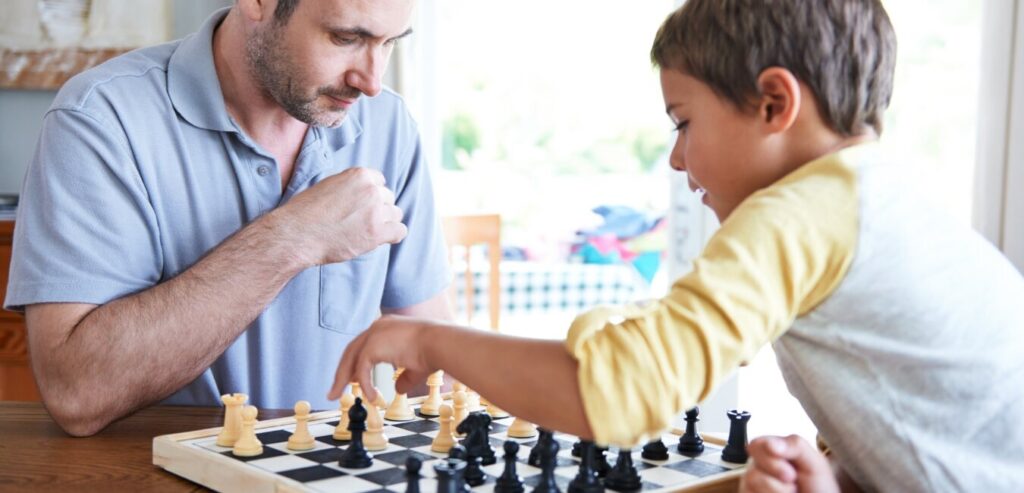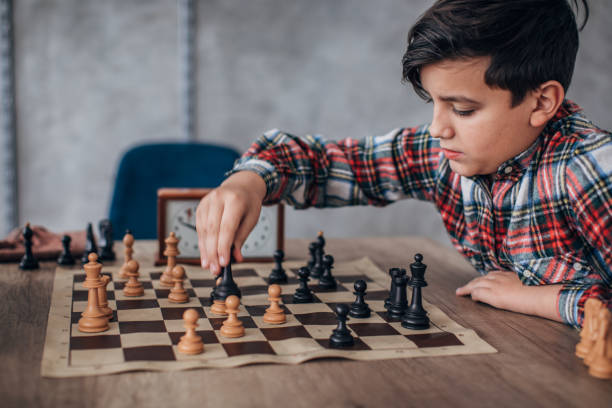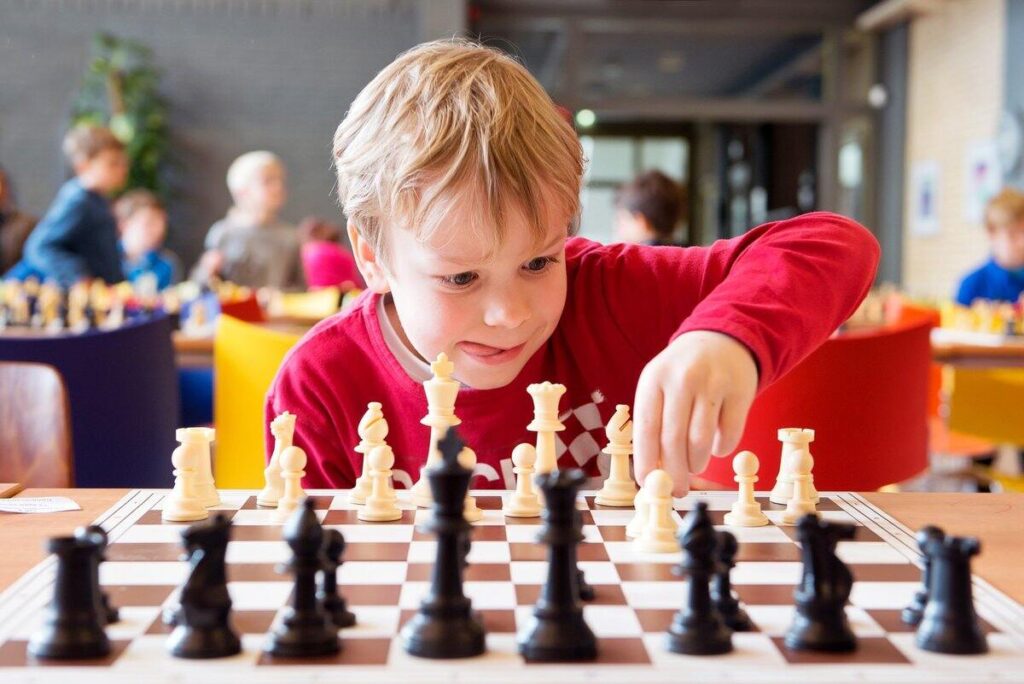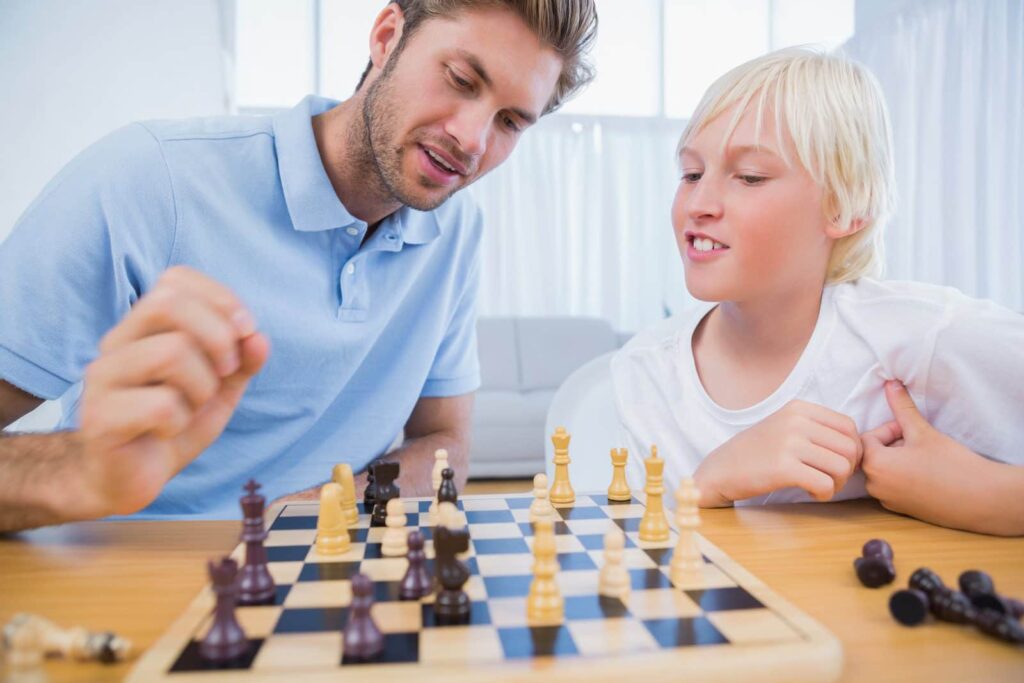As parents, we are always looking for ways to help our children grow, learn, and succeed in life. Whether it’s through school, sports, or hobbies, we want to give them tools that can shape their thinking and prepare them for challenges they’ll face. One of the most effective yet often overlooked tools for developing key life skills is chess. Chess is not just a game. It’s a powerful way to sharpen the mind, especially when it comes to problem-solving.
You might think of chess as a pastime for quiet thinkers or competitive players, but when children start learning and playing chess, they develop problem-solving skills that can benefit them for life. In this article, we will explore why every parent should consider encouraging their children to play chess, focusing specifically on how chess nurtures problem-solving abilities.
The Importance of Problem-Solving Skills in Today’s World
Problem-solving is a critical skill that every child needs to develop. Whether they are tackling schoolwork, handling social issues, or later navigating career challenges, problem-solving will be a key part of their success.
Children face challenges every day, both big and small, and their ability to solve problems effectively can determine how well they cope and grow from those experiences.
So, how does chess fit into this? Chess, by its very nature, is a game of problems.
It’s a game where players constantly face dilemmas, decisions, and obstacles that need solutions. By playing chess, children learn how to approach problems with a clear mind, analyze their options, and choose the best solution based on logic and foresight. These are valuable lessons that can carry over into every aspect of their lives.
How Chess Teaches Problem-Solving
Chess is a game where each move requires thought, planning, and anticipation. It’s not enough to just react to what’s happening on the board; a player needs to look ahead, anticipate possible outcomes, and consider how their moves will affect the overall game.
This type of thinking is exactly what problem-solving is all about.
Breaking Down Complex Problems
One of the greatest strengths of chess is its ability to teach children how to break down complex problems. Chess boards may look complicated, but skilled players understand that you need to take things one step at a time.
The same goes for real-life challenges. Children who learn to play chess develop the ability to dissect problems, piece by piece, and find the best solution by focusing on one aspect at a time.
When children play chess, they don’t just see a full board of pieces—they learn to focus on the most critical part of the game at that moment. Is it the need to defend their king?
Or is it time to attack their opponent’s queen? By narrowing their focus and breaking down a complex situation into smaller, more manageable pieces, children learn that even the toughest problems can be solved step by step.
Teaching Cause and Effect
Another important aspect of problem-solving is understanding cause and effect. In chess, every move has consequences. If a child makes a hasty or ill-thought-out move, they might lose a valuable piece, or worse, open themselves up to losing the game.
But when they make a strategic move, they can gain a significant advantage. Chess teaches children that their actions directly affect the outcome, which is the essence of cause and effect.
This lesson applies to life as well. By learning that every action has a consequence, children begin to understand that decisions should be made carefully.
Whether they’re dealing with a school project, handling a friendship issue, or later managing a job responsibility, this understanding of cause and effect helps them make more informed decisions.
Developing Critical Thinking
Critical thinking is a skill that grows naturally through chess. Chess players constantly analyze their position, evaluate their options, and determine the best course of action.
This process of weighing different possibilities, predicting outcomes, and making strategic decisions is essential for good problem-solving.
Children who play chess regularly become better critical thinkers. They learn to look at situations from multiple angles and consider various factors before making a decision.
This thoughtful approach to solving problems is a key benefit of playing chess, and it’s a skill that can be applied to everything from schoolwork to social situations.
Building Patience and Focus
Chess teaches children to slow down and think before they act. In today’s fast-paced world, many kids are used to instant gratification. But in chess, rushing through moves can lead to mistakes.
This encourages patience, as players must carefully think about their next step and anticipate their opponent’s move.
Learning to Focus
Chess requires deep concentration. If a player’s mind wanders, they can easily make a mistake. Over time, children who play chess learn to focus for longer periods, improving their attention span.
This focus isn’t just useful in the game—it helps in school, especially when tackling difficult tasks or exams.
The Value of Thinking Ahead
Good chess players always think a few moves ahead. They consider different scenarios and prepare for possible outcomes.
This is an essential problem-solving skill: the ability to plan ahead and consider future consequences. It helps children become better planners, making them more effective at handling projects, assignments, and even social situations.
Chess and Resilience
Failure is part of learning, and chess teaches children how to handle setbacks with grace. Not every game will be won, and not every strategy will work.
This helps children understand that it’s okay to make mistakes as long as they learn from them.
Bouncing Back from Defeat
In chess, every loss teaches something valuable. Whether it’s a careless mistake or a poor strategy, each loss helps players improve for the next game.
This builds resilience—the ability to recover from failures and try again. Children who learn this through chess are more likely to bounce back from setbacks in life, whether it’s a tough exam or a personal disappointment.
Learning to Adapt
Chess is a game of constant change. What works in one game may not work in the next.
This teaches adaptability. Children who play chess learn to shift their strategies and think on their feet when faced with new challenges, an important aspect of problem-solving.
Boosting Memory and Recall
Chess isn’t just about moving pieces; it’s about remembering patterns, strategies, and past mistakes. Over time, children develop strong memory skills as they recall previous games, tactics, and lessons learned.
Recognizing Patterns
Experienced chess players recognize certain patterns on the board. They can quickly recall winning strategies or dangerous moves based on previous games.
This helps sharpen their memory, which can be especially helpful in subjects like math and science, where pattern recognition is key.
Memorizing Strategies
Chess also teaches children to memorize opening sequences, endgame strategies, and famous tactics used by top players.
This strengthens their ability to retain information, a skill that benefits them in both schoolwork and everyday life.
Developing Decision-Making Skills

Chess constantly pushes children to make decisions. Every move requires careful thought, weighing the risks and rewards. This helps children become confident decision-makers, a critical aspect of problem-solving.
Evaluating Options
In chess, players are presented with multiple options, each with its own potential consequences.
Children learn to assess these options carefully, considering which will lead to the best outcome. This skill translates directly into real-life problem-solving, helping children make more thoughtful decisions.
Handling Pressure
Some chess games, especially competitive ones, put players under time pressure.
Children must make quick, yet sound decisions. This ability to stay calm and think clearly under pressure is a vital skill in exams, sports, or any challenging situation they may face in life.
Enhancing Creativity
While chess is a game of logic, it also requires creativity.
Sometimes the best solutions come from thinking outside the box. Chess encourages children to explore unconventional strategies and surprise their opponents with creative moves.
Thinking Outside the Box
In chess, there are standard strategies, but great players know when to break the rules to outsmart their opponent.
This creative thinking helps children approach problems from new angles, finding solutions that might not be immediately obvious.
Problem-Solving Through Innovation
In challenging situations, creativity often leads to the best solution.
Chess players frequently need to come up with inventive ways to escape difficult positions or turn a losing game around. This teaches children that being innovative is sometimes the key to solving tough problems.
Improving Emotional Control
Chess is a game that stirs emotions—victory feels great, but defeat can be frustrating. However, chess teaches children how to control their emotions, especially during intense games where staying calm is key to making good decisions.
Keeping Cool Under Pressure
Chess helps children learn how to stay calm, even in stressful situations. Emotional control is important for problem-solving because it helps children avoid impulsive decisions and focus on logical solutions instead.
Learning to Manage Wins and Losses
Chess teaches that sometimes you win, and sometimes you lose. Learning to handle both outcomes gracefully helps children manage their emotions better in real life, especially when facing personal or academic challenges.
Building Confidence
Chess is a game of skill, and as children improve, their confidence grows. With each game played, children see their progress, which boosts their self-esteem.
Confidence in Decision-Making
As children learn to make smarter moves in chess, they become more confident in their ability to make decisions. This self-assurance in their thought process extends beyond the game, helping them approach life’s challenges with a sense of capability and calm.
Celebrating Small Wins
Even small achievements in chess, like successfully defending a position or capturing a key piece, help build confidence.
Children learn that hard work and focus pay off, giving them the belief that they can solve even the most difficult problems with perseverance.
Encouraging Independence
In chess, every decision is the player’s own. There’s no one to rely on but themselves, which teaches children to trust their instincts and judgment.
Self-Reliance
Chess fosters independence because children must take full responsibility for their moves. They learn to rely on their own analysis and judgment, which is essential for personal growth and problem-solving.
Taking Ownership
Whether a child wins or loses, they own the outcome. This helps them understand that their actions have consequences, encouraging them to be accountable for their decisions, which is a key part of developing strong problem-solving skills.
Chess and Academic Improvement
The problem-solving skills gained through chess often lead to better performance in school. The mental discipline, focus, and strategic thinking needed in chess carry over into subjects like math, science, and reading.
Boosting Math Skills
Chess improves logic and pattern recognition, which are vital in math.
Children who play chess often become more comfortable with numbers and abstract thinking, as chess naturally engages the same cognitive processes used in math problem-solving.
Enhancing Reading Comprehension
Chess improves concentration and memory, which can enhance a child’s reading skills. By focusing on the game and remembering strategies, children also develop better comprehension and retention when reading school material.

Promoting Patience and Discipline
Chess is not a game of instant gratification. It requires patience and discipline, as each move must be thought out carefully, and quick decisions often lead to mistakes.
Over time, children who play chess learn the value of waiting and planning, key traits for effective problem-solving.
Delayed Gratification
Chess teaches children that the best outcomes often come from long-term planning. Instead of going for immediate gains, successful players wait for the right moment to execute their strategy.
This lesson in delayed gratification helps children understand that sometimes the best rewards take time, a skill that’s beneficial for both academic and personal challenges.
Developing Self-Control
Since chess encourages players to think several moves ahead, children learn to control impulsive actions.
They realize that acting too quickly without thinking can lead to poor outcomes, helping them practice self-control in both chess and real-life situations. This discipline is key when solving problems that require time and reflection.
Encouraging Strategic Thinking

Chess is a strategy game at its core. To win, players must think ahead, plan their moves, and anticipate their opponent’s reactions.
This process mirrors the way children need to approach real-life problems, especially those that require careful thought and planning.
Learning to Plan
In chess, good players always have a strategy. They know their ultimate goal and create a plan to achieve it, step by step. This ability to think ahead teaches children to plan for future outcomes and set goals.
Whether they are preparing for an exam, a project, or life decisions, strategic thinking helps them stay organized and focused.
Anticipating Consequences
Chess players must also predict their opponent’s next move. This teaches children to think about how others will respond to their actions, helping them develop empathy and foresight.
In real life, this skill is essential when solving problems that involve other people, as it encourages children to consider different perspectives before making decisions.
Chess Fosters Creativity
While chess is known for its logic, it also fosters creativity. The best players are those who think creatively to outsmart their opponents, using unexpected moves to gain an advantage.
Chess teaches children that sometimes, the best solutions come from thinking outside the box.
Inventing New Solutions
In tough situations, chess players often need to come up with innovative moves to solve problems on the board. This creative problem-solving skill helps children become more flexible thinkers.
They learn that when traditional methods don’t work, it’s okay to invent new ones, a valuable lesson in real-life challenges.
Exploring Different Approaches
Chess allows players to experiment with different strategies. One game might require a defensive approach, while another demands an aggressive one.
This flexibility in thinking encourages children to explore various ways to approach a problem, helping them become more adaptable and open-minded in other aspects of life.
Enhancing Concentration and Focus
Chess requires intense focus. Every move matters, and distractions can lead to mistakes that could cost the game.
Over time, children who play chess improve their ability to concentrate for longer periods, a skill that directly benefits their problem-solving abilities.
Strengthening Attention Span
In chess, a single game can last from several minutes to several hours. Staying focused for that long helps children improve their attention span.
This skill becomes incredibly useful in academic settings, where long periods of focus are often required to solve complex problems or complete challenging tasks.
Managing Distractions
Chess teaches children how to manage distractions and maintain focus even under pressure. In a game, it’s easy to lose track of what’s happening if you get distracted, but successful players learn to block out everything except the board.
This ability to maintain focus, even in stressful environments, prepares children for problem-solving in high-pressure situations, such as exams or competitions.
Teaching Responsibility and Accountability

In chess, each player is responsible for their own moves. There’s no blaming teammates or bad luck—only the player’s decisions shape the game’s outcome.
This responsibility encourages children to take ownership of their choices, an important lesson in both chess and life.
Owning Decisions
Children quickly learn in chess that every move, whether good or bad, is their own decision. This sense of accountability teaches them to reflect on their choices and learn from their mistakes.
When they make a poor move, they can’t blame anyone else; they learn to evaluate what went wrong and how to improve. This helps them develop the critical ability to own their decisions and grow from them.
Learning Consequences
Since every move in chess has consequences, children understand that their actions affect the outcome of the game. This teaches them that thoughtful decisions lead to better results, a concept that applies to real-life problem-solving.
The idea that their choices have consequences, both positive and negative, prepares them to make more informed and deliberate decisions in everyday situations.
Chess as a Confidence Builder
As children improve their chess skills, they naturally become more confident in their ability to solve problems. Every small success on the chessboard reinforces the idea that with effort and patience, they can overcome challenges and reach their goals.
Gaining Confidence from Experience
The more games children play, the more they see themselves improving. Whether it’s learning a new opening, finding a clever tactic, or finally beating a tough opponent, each achievement boosts their confidence.
This growing self-assurance in their chess abilities translates to other areas of their lives, encouraging them to approach problems with confidence and determination.
Believing in Their Problem-Solving Abilities
As children start solving more complex problems on the chessboard, they begin to trust their problem-solving instincts.
They learn that they have the capability to think through challenging situations and find solutions. This confidence in their own thinking process empowers them to take on new problems, both in chess and in real life, with a positive mindset.
Social and Emotional Growth Through Chess
Though chess is often seen as a solitary game, it actually has significant social and emotional benefits. Whether playing in clubs, online, or in friendly matches, chess fosters social interaction and emotional growth.
Building Patience with Others
Chess requires players to wait for their opponent’s moves and respect their time. Children learn patience as they wait for their turn, and they also develop respect for others’ thought processes.
This teaches children that patience and understanding are key when working with others, a valuable lesson in both social settings and collaborative problem-solving.
Strengthening Empathy
Good chess players learn to think about the game from their opponent’s perspective. Anticipating what their opponent might do next requires children to consider someone else’s point of view.
This ability to step into another person’s shoes fosters empathy, a skill that is crucial in social problem-solving, such as resolving conflicts or working in teams.
Chess Is More Than a Game
Chess is often seen as just a pastime, but it’s far more than that. It’s a powerful tool that helps children develop skills they’ll use throughout their lives.
The ability to solve problems, think critically, and stay calm under pressure are just a few of the many lessons chess teaches.
A Foundation for Future Success
By encouraging chess, parents give their children a foundation for future success. The problem-solving and critical thinking skills developed through chess will help them not just in academics, but in all areas of life—whether it’s making decisions, handling challenges, or navigating complex situations.

Building Stronger Minds
Chess is like exercise for the brain. Each game stretches the mind, challenges it, and helps it grow stronger.
The more children play, the sharper their thinking becomes, and this mental agility carries over into all aspects of learning and decision-making.
Teaching Life Skills Early
Chess gives children the chance to learn valuable life skills at an early age. They learn patience, responsibility, and how to handle both success and failure.
These lessons stick with them, shaping how they approach problems as they grow older.
Growing Confidence with Every Move
With every game of chess, children become more confident in their abilities to tackle problems.
This confidence isn’t limited to the chessboard—it spreads into all aspects of their lives, helping them believe they can face and solve any challenge that comes their way.
Wrapping it up
chess is a powerful tool for developing essential problem-solving skills in children. It teaches patience, critical thinking, and the ability to break down complex problems, all while building confidence and emotional resilience.
As children improve in chess, they also grow in their ability to handle real-life challenges with thoughtfulness and independence. Encouraging your child to play chess is one of the best ways to equip them with the mental tools they need for success. If you’re ready to help your child unlock their potential, consider enrolling them at Global School of Chess today.
READ NEXT:

